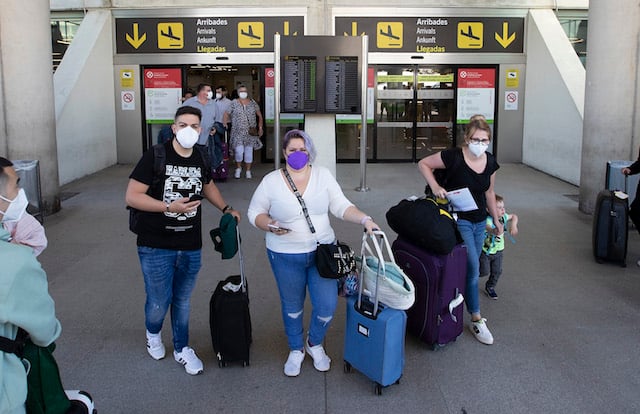Spain finally opened its borders to travellers from June 7th, meaning that Americans are now free to visit.
Originally Spain was only allowing vaccinated travellers to visit, but from June 24th the US was added to the list of low-risk countries, meaning that there is currently no requirement to bring proof of vaccination or a negative Covid-19 test result.
The US State Department also eased travel restrictions for Spain, moving the country from its “do not travel” list (level 4) to “reconsider travel” (level 3).
The US Embassy in Spain advises however that the situation "may change with short notice, so be sure to review this information as close as possible to your travel date".
READ MORE: What does the US's new risk classification for Spain mean for American travellers?
Normal entry requirements
American citizens can enter Spain visa-free for periods of up to three months. You may be required to provide proof of an ongoing or return ticket or proof of funds.
According to US embassy in Spain, if you wish to remain longer than 90 days, you will be required to obtain an extension of stay from Spanish immigration authorities. The extension, of no more than 90 days, must be requested at a police station at least three weeks before the initial entry period expires. It only granted under exceptional circumstances.
Make sure to check the expiration date on your passport before travelling to Spain. Entry into any of the 26 European countries in the Schengen area for short-term tourism, a business trip, or in transit to a non-Schengen destination, requires that your passport be valid for at least three months after your date of departure. If your passport does not meet the requirements, you may be refused boarding or refused entry when you arrive. The US embassy in Spain “recommends that your passport have at least six months’ validity remaining, whenever you travel abroad.
Advertisement
Covid entry requirements
From June 24th, those visiting Spain from US can travel Spain without the need for a vaccination certificate or a negative test result.
The only Covid requirement is that you fill out a health control form via the Spain Travel Health portal or by downloading the 'SpTH app' from the Google Play Store or iTunes App Store for each traveller. This will enable you to download a QR code, which you will show upon arrival.
The Spanish authorities state: “Regardless of your country of origin, all passengers arriving in Spain by air or sea, including those in transit and children under 6 years of age, must complete a health control form before their departure”.
You may also have to undergo physical health checks upon arrival which include a temperature check, a visual check and a documentary check.
Find out more about the health control form here.

Tourists arrive at Son Sant Joan airport in Palma de Mallorca on June 7, 2021. Photo: JAIME REINA / AFP
Advertisement
Once in Spain
When you have arrived in Spain, you'll find that many of the strict restrictions such as nightly curfews and travel bans between regions are gone.
On June 26th, the requirement to wear a mask outdoors was also abolished, meaning that now you only have to wear a mask indoors, on public transport or outdoors when a distance of 1.5 metres cannot be maintained.
READ ALSO: EXPLAINED: Where and when do you still have to wear a face mask outdoors in Spain?
Other restrictions still in place include limits on the numbers at social gatherings, capacity limits at bars and restaurants, as well as major tourist sights, and earlier closing hours than normal.
Nightlife venues also began to open up in most regions from June 25th and current rules indicate they're allowed to stay open until 3am, however Spain's regions often have their own rules so this time may vary.
READ ALSO: Going out in Spain: What are the new rules for bars and nightclubs?
The rules and restrictions vary between each of Spain's 17 regions, so make sure you've read up on the rules where you're going.
READ ALSO:


Join the conversation in our comments section below. Share your own views and experience and if you have a question or suggestion for our journalists then email us at [email protected].
Please keep comments civil, constructive and on topic – and make sure to read our terms of use before getting involved.
Please log in here to leave a comment.